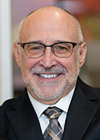Supporting the Transition to Residency Amid COVID-19
Published August 19, 2021

From the President
Robert A. Cain, DO
President and CEO
American Association of Colleges of Osteopathic Medicine
As COVID-19 continues to surge across the country and around the world, we acknowledge that a significant amount of stress and confusion about how to safely move forward with educating the next generation of osteopathic physicians continues to pose challenges to our colleges of osteopathic medicine and to graduate medical education (GME) institutions. Many of the plans made for this academic year have required change—from creating new safety partitions in classrooms to offering remote classes and requiring re-masking. As the most serious cases of COVID-19 continue to affect unvaccinated individuals, we persist in strongly encouraging everyone in the osteopathic medical education community, and individuals everywhere, to receive the COVID-19 vaccination. This August marks National Immunization Month, and the need to take this necessary, safe and lifesaving precaution has never been more pronounced.
As osteopathic medical students begin to prepare to submit their residency applications to GME programs next month, AACOM is working to help make this transition, which is difficult even in the best of times, easier.
On August 6, AACOM’s Assembly of Osteopathic Graduate Medical Educators (AOGME) hosted its third Virtual Residency Fair, an event connecting residency candidates with GME programs nationwide. Seventy-nine institutions with residency programs across various specialties, including family medicine, internal medicine, general surgery, emergency medicine, pediatrics, dermatology, orthopedic surgery and anesthesiology, connected with the more than 2,000 event registrants.
GME professionals, AACOM staff and current resident physicians presented throughout the day, discussing tips on virtual and behavioral interviewing, AACOM match data and resources, resident physician perspectives on residency applications and experiences across specialties and more. Attendees were able to speak directly with program coordinators, access resources at virtual booths and chat with program directors, current resident physicians and fellow medical students on the virtual platform.
“This was a fantastic event!” said one program representative. “Next year I will have more residents with me so we can talk to more students.”
“[There was] excellent organization and thought in providing useful topics,” said a medical student. “[It was] easy to navigate and use features [and there was a] well-structured schedule and succinct talks.”
We thank everyone who participated in our Virtual Residency Fair for making the event so successful and beneficial. To stay engaged with our future GME programming, events and resources, we encourage GME professionals to become AOGME members, and invite resident and fellow physicians to join the AOGME Residents and Fellows Council.
#GMEProfessionalsDay
AACOM is also excited to join the Association for Hospital Medical Education (AHME) in celebrating their first-ever GME Professionals Day tomorrow, August 20, as designated by AHME’s Council of Program Administrators and Coordinators. Join us in celebrating the important contributions made by the GME professionals who staff your programs and central GME offices.
Effective GME leadership and administration is highly dependent on the knowledge, skills and attitudes these individuals possess and the dedication they exhibit in supporting the designated institutional officials, program directors, faculty members, fellows, residents and medical students with whom they interact. GME professionals play an important role in ensuring that each learner has the opportunity to realize their professional potential and establish a solid foundation to enter independent practice and pursue a long career providing excellent care.
As AACOM celebrates a record number of osteopathic medical students placing into residency positions in 2021, we honor and thank the GME professionals who are preparing and equipping them to care for patients as they train to become practicing DOs.
